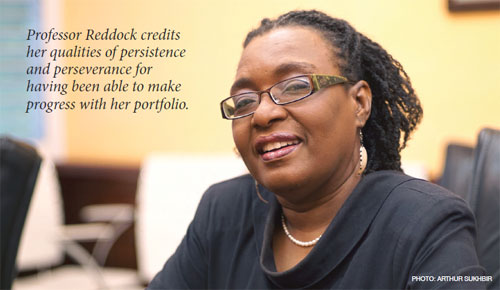

“In addition to her general responsibilities related to the overall management of the campus, the work of the Deputy Principal focuses primarily on academic quality and students. I have taken my lead from the first strategic aim of The UWI’s Strategic Plan 2007-2012, which speaks of preparing a distinctive UWI graduate for the 21st Century.”
So says Deputy Principal Professor Rhoda Reddock as she launches into the final year in her position, after eight years in that office.
Professor Reddock welcomes the extended term (until July 2017) as an opportunity to work with the new campus principal, Professor Brian Copeland.
In addition to her wide and packed portfolio, Professor Reddock has initiated or contributed to a number of university-level and campus policies. Some have been implemented while others are still in development. Among them are policies on Alcohol; Student-Athletes; Health and Wellness; and a revision of the one on Sexual Harassment.
Her overarching goal remains to support the University’s Strategic Plan in producing graduates who have a regional frame of reference and exemplify the following attributes: “a critical and creative thinker; a problem solver; an effective communicator; knowledgeable and informed; competent; a leader; a team player; skilled and information literate; socially and culturally responsive; ethical; innovative and entrepreneurial; and a lifelong, self-motivated learner.”
“The UWI is responsible for the holistic development of its graduates – where our programmes and degree tracks cultivate academic excellence, intellectual freedom, technical competence, creativity, ethics and integrity, civic responsibility, diversity and equity,” she said.
With this output driven agenda, Professor Reddock will be engaging in “a year of consolidation.” She will be seeking to fully institutionalise or ensure these systematic adjustments are integrated and adopted by staff and students alike. It’s one challenge to make changes, and another to have them accepted and sustained.
Professor Reddock credits her qualities of persistence and perseverance for having been able to make progress with her portfolio. Her understanding of the university system also helps – she was head of the Institute for Gender and Development Studies for 14 years, since it was a Centre. She thinks that her ability to see the big picture while simultaneously attending to details has been instrumental in getting the job done right.
Her goals are to structure a programme of mutually beneficial UWI services to at least one of the communities surrounding the campus involving faculty, staff and students working together; to work with the Director, DSSD and the Guild of Students on strengthening the Guild’s administrative systems; to progress the Campus Museum and Art Gallery project, as well as The UWI’s After School Centre; implementation of the Student-Athlete Policy and to work with the DSSD director and staff and other faculty to develop strategies for expanding diversity and inclusion awareness, for instance, sexual rights. She admits that none of this could be achieved without the support and commitment of staff and faculty.
Her schedule has limited some of her professional pursuits. Since becoming Deputy Principal, she has had to limit her local and international engagement with academic and activist causes. She has put the writing of three books on hold. These include publications from her collaborative research on youth sexual cultures and the Break the Silence project, from which emanated a successful campaign against child sexual abuse. Her book on race/ethnicity, identity and citizenship in T&T has also been on hold. She looks forward to completing these. During this period, she has still managed to publish seven peer-reviewed articles, four book chapters and seven encyclopedia entries.
Professor Reddock’s work demonstrates her deeply rooted belief that The UWI graduate, and by extension the Caribbean people, must be equipped to transform the trajectory of development and commit to social justice in this region and the world.
Rebecca Robinson is a writer and editor.
Professor Rhoda Reddock has been the architect of improvements in several key areas, many related to student life at The UWI, St. Augustine: Teaching, Learning and Student Development (under which fall Academic Quality and Student Engagement and Experience); the establishment of the Student’s Request for Deputy Principal’s Intervention Online System; revitalising and expanding co-curricular programmes; enhancing and synchronizing the student orientation processes; establishing the Student Academic Support Unit within the then ASDLU which, among other things, provides peer tutoring for students with academic challenges, the integration and expansion of Student Services into the new Division of Student Services and Development which introduces a number of new services and programmes such as – Financial Advisory Services, Off-Campus and Commuting Students Services and International, Graduate and Mature Student Support; The Student Services Seminar Series; the Biennial Conference on Sport Studies and Higher Education; facilitation of the Safe Space Initiative within the CAPS for sex/gender diverse students; Halls of Residence – Transformation into Living and Learning Communities by establishing Residence Assistants, Halls Code of Conduct and Zero-Tolerance to ‘hazing and grubbing;’ Expanding Access to the Student Health Insurance; institutionalising Service-Learning and Community Engagement; establishment of the Campus Museum Committee which is working towards a Campus Museum and Art Gallery and support to the UWI After-School Care Centre.
|





